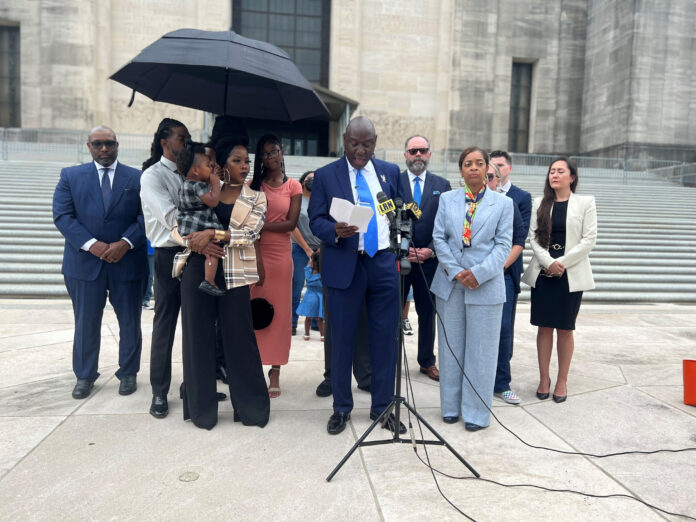A Louisiana woman who was carrying a fetus with a lethal congenital disorder was forced to travel over 2,200 kilometres to New York to get an abortion after doctors at her local hospital denied performing the procedure for fear they would be prosecuted under their state’s ambiguously worded laws.
Nancy Davis, 36, found out about 10 weeks into her pregnancy in late July that her unborn child had a rare condition called acrania, which prevents a fetus’ skull from forming in the womb. According to the Fetal Medicine Foundation, an acrania diagnosis is considered lethal for the baby and usually results in death within a week of birth. Sometimes death can occur in minutes.
Davis’ doctors recommended that she get an abortion to avoid “the physical and emotional trauma” of bringing her unborn baby to term since the chances of its survival were practically nil.
But when she tried to get an abortion in her home state of Louisiana, she was met with nothing but closed doors.
When the U.S. Supreme Court overturned the landmark Roe v. Wade precedent, which had previously guaranteed a federal right to abortion access, trigger laws in Louisiana immediately made abortion illegal in the state.
People can still get an abortion in Louisiana if their fetus cannot survive outside of the womb, but the state’s abortion ban does not list acrania as one of the conditions that qualifies mothers for an exception.
According to The Guardian, state senator and author of Louisiana’s abortion ban, Katrina Jackson, insisted that Davis would have been able to legally get an abortion in her home state, but the medical providers Davis spoke to were not so certain.
After an ultrasound showed that Davis’ fetus had not developed a skull, she asked doctors at her hospital to provide an abortion. They refused, fearing that they would face jail time, fines, and the removal of their medical licences if they performed the procedure.
Trending Stories
Parole records reveal lengthy criminal past of gunman behind GTA shooting rampage
York Regional Police officer, aged 38, dead after head-on crash in Markham
“Basically they said I had to carry my baby to bury my baby,” Davis said in a news conference in late August.
Civil rights lawyer Benjamin Crump, who is representing Davis, slammed state legislators for the “inhumane” treatment of his client.
“Thanks to the actions of the Louisiana legislator, Ms. Davis was left without medical care to do what doctors said needed to be done, end the pregnancy. By imposing themselves between Ms. Davis and her doctors, Louisiana lawmakers inflicted unspeakable pain, emotional damage, and physical risk upon this beautiful mother,” he said.
“They replaced care with confusion. Privacy with politics. Options with ideology.”
Davis and Crump are calling for Louisiana’s abortion ban to be repealed, or, at the very least, for the wording of the legislation to be clarified.
“This is not fair to me and it should not happen to any other woman. This has truly been an emotional roller-coaster,” Davis said.
After Davis spoke to the media about her ordeal, more than a thousand people donated over US$40,000 to her online GoFundMe campaign to help her travel for the abortion. Initially, she planned to get the procedure done in North Carolina but ended up travelling to a Planned Parenthood facility in Manhattan.
Davis is just one of many people who have been forced to take difficult measures following the repeal of Roe v. Wade.
In mid-August, a Florida court blocked a 16-year-old girl from getting an abortion, ruling that she was not “mature” enough to terminate the pregnancy and requiring her to give birth to the baby.
In July, a 10-year-old girl from Ohio was forced to cross state lines to get an abortion after she was raped and impregnated because of her state’s “fetal heartbeat” law, which bans most abortions after six weeks.
The girl got an abortion in Indiana, a state which recently passed the first new abortion ban since Roe v. Wade was repealed. The new law, which is set to take effect on Thursday, will ban most abortions, with exceptions for rape, incest and serious medical emergencies.
© 2022 Global News, a division of Corus Entertainment Inc.



